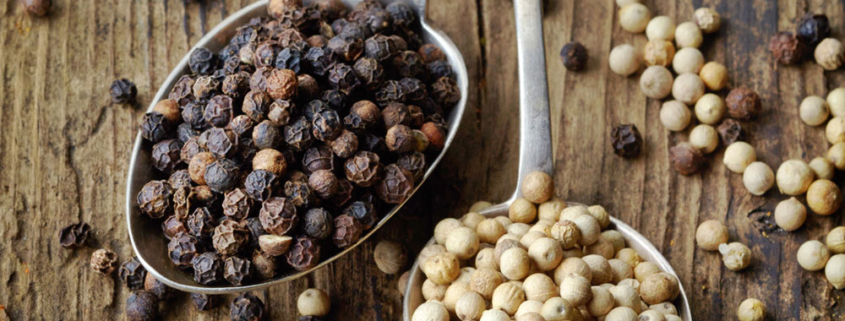White Pepper Vs Black Pepper: What’s The Difference?
White Pepper Vs. Black Pepper
Black pepper is the berry of the pepper plant, and white pepper is the seed. After they are sun-dried, black pepper retains its signature heat, but white pepper becomes milder. Black pepper also lasts longer than white pepper; but it’s best to buy whole peppercorns rather than ready powders. Use black pepper in dishes that need a flavor boost. Use white pepper for lighter, earthier soups to add a mild heat.
Black pepper is a staple in American kitchens. In fact, take a seat at any restaurant and you’ll find salt and pepper shakers! But did you know that white pepper also exists? It’s widely used in Thai, Chinese, and Vietnamese cuisines.
While they’re both from the pepper plant, there are differences between black and white pepper. It all comes down to the way they are processed, which totally sets them apart. Here are 4 differences between white pepper and black pepper.
1. Black Pepper Is The Berry; White Pepper Is The Seed
Side Effects Of Ginger And Who Should Not Consume It
10 Health Benefits Of Pippali Or Long Pepper: Turn Up the Heat
Amazing Health Benefits And Uses Of Spices: 10 Reasons Spice Is Nice!
10 Health Benefits Of Bay Leaves That Keep Diseases At Bay
4 Ways Turmeric Root Can Benefit Your Health
5 Proven Benefits Of Turmeric And Black Pepper Together
Side Effects Of Ginger And Who Should Not Consume It
10 Health Benefits Of Pippali Or Long Pepper: Turn Up the Heat!
You might be surprised to learn that whole black peppercorns are actually berries. They’re harvested while they’re still green, just before ripening. Next, they are sun-dried until they turn black and wrinkly. This is the type of pepper most of us are familiar with.Advertisement
White pepper is actually the seed of those berries. When the berries are picked, the outer layer is removed with water. The berries might be soaked or washed several times with running water. These days, chemical processes might be used.
This seed is also sun-dried but turns white instead of black. And since white pepper has been washed, it’s usually smoother than the black kind.
2. Black Pepper Is Hotter Than White Pepper
By the time whole black pepper dries, it has its strongest flavor possible. It’s best when freshly grounded, since store-bought ground pepper will lose its punch after sitting on the shelf. In either case, black pepper is richer and bolder. It also has a lot of heat, topped off with a strong aroma.Advertisement
If you have a milder palette, white pepper is ideal. The flavor is earthy, light, and simple. It’s useful for spicing up dishes that need just a little extra something. White pepper is also ideal if you’re not a fan of heat.
3. Black Pepper Lasts Longer Than White Pepper
When kept in a sealed container, whole black peppercorn can last for about a year. The pre-ground version, however, loses its best flavor after just a few months. This is exactly why you can find bottles of whole peppers with built-in grinders.
Since white pepper is more “exposed” than black, it loses its flavor faster. It will turn stale before you know it! So if you decide to cook with white pepper, remember that freshness is always important.Advertisement
4. White Pepper Is More Apt For Lighter, Earthy Dishes
Aside from flavor, a major difference between black pepper and white pepper is the final visual. Black pepper is often used in dishes that are already colorful. If there’s a lot of elements in it, black pepper will just blend right in.
Some people don’t like having black flecks in their dishes. This is especially true with lighter dishes like white soups and sauces. It comes down to preference and the intended presentation.
How To Use Black Pepper And White Pepper
A dish that’s lacking personality and flavor can benefit from black pepper. For the best taste, do be sure to use the freshly ground kind. Everything from breakfast omelets to tuna sandwiches can be transformed with black pepper. It can even add an extra kick to plain hummus, yogurt dips, or chopped veggies.Advertisement
If you’re all about aesthetics, opt for white pepper. It’ll blend right into lighter dishes. But it can also be useful in earthy meals that have saffron, cumin, and turmeric. White pepper is also ideal if you want to boost the flavor without overtaking other elements.
Some recipes call for both white and black pepper. But if it only requires one, try to use it. The vast difference between white and black pepper will matter!

 no
no no
no no
no